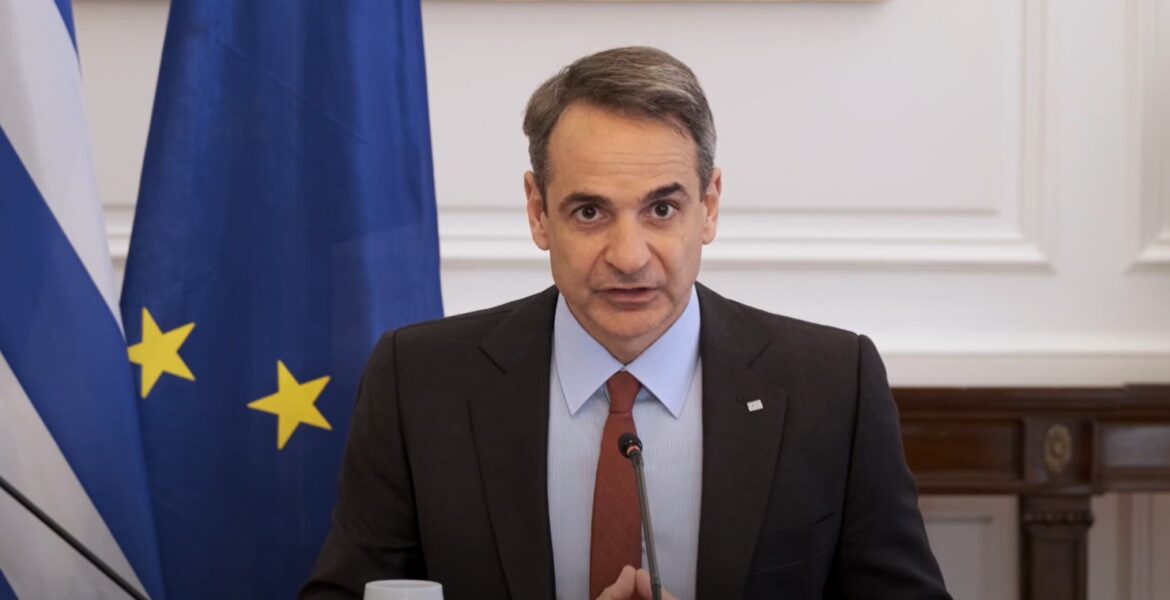Those who know Prime Minister Kyriakos Mitsotakis know almost immediately that his move to inform on March 1 the Plenary Session of the Parliament about the Russian invasion of Ukraine - the Greek attitude towards this event was not at all accidental.
The Prime Minister wanted to send specific messages in different directions, but also to clearly state the ideological and geopolitical background of his choice of not only to side with Kiev, but also to send military aid to the government of Volodymyr Zelensky.
Against revisionism
The key word that sums up Mr. Mitsotakis' "belief" in relation to his position on the Ukrainian Question is revisionism.
"Either you are with peace and international law or you are against them" was the first critical phrase that the careful observer must pick from the Prime Minister's prologue.
The second followed a little later: "We will not allow any imitator of revisionism to operate in our region." And the recipient, even if he was not named, was one: Turkey.
There is no doubt that Vladimir Putin's decision to invade Ukraine militarily dispelled all of Europe's post-Cold War illusions.
In our neighbourhood, however, in Southeastern Europe and the Eastern Mediterranean, the proximity to the unpredictable and revising Turkey has created a different geopolitical vigilance.
"We are a people that 48 years later still lives with the open wound of Cyprus," said Mr. Mitsotakis in Parliament. "And who is called upon to respond to constant reports of alleged injustices of the International Treaties concerning the Aegean islands."
"So we cannot stand indifferent to every authoritarian leader who wants to draw the borders himself," he continued, adding: "Therefore, equal distances do not fit here."
In the frame the hegemonic ambitions of Ankara
People who know the Prime Minister's way of thinking emphasise that he considers events in Ukraine as a turning point that undoubtedly concerns the expressed regional hegemonic ambitions of Ankara.
How easy it will be now, when Moscow decided to overthrow the territorial integrity and sovereignty of Ukraine, to find suitable ground in Europe.
Beyond that is the Turkish arguments for Greece's "conditional sovereignty" over the Eastern Aegean and Dodecanese islands.
"I think everyone today has realised that revisionism in practice can come at a huge cost, noted Mr. Mitsotakis.
Athens is not complacent and sends messages
Of course, this does not mean that Athens is complacent, as Ankara is still playing the "card" of the "evasive neutral" - in the classic definition of Frank Weber - balancing Russia and the West.
But it does not close doors.
Responding to the leader of the official opposition, Alexis Tsipras, Mr. Mitsotakis appeared ready to even meet with Turkish President Recep Tayyip Erdoğan, as "indeed this circumstance may have justified such a meeting to discuss issues which concerns both the southeastern wing of NATO and the way in which we perceive the new challenges that the Ukrainian crisis has created."
This does not mean, of course, that a contact between the two leaders could not be made by telephone.
In fact, it might have helped to send a message that the tones that have risen a lot lately in Greek-Turkish relations have fallen - an element shared by circles in the neighbouring country as well.
Eligibility for increased defence spending
However, the belief that prevails at the Maximos Palace is that Greece has been placed correctly on the current geopolitical chessboard.
"The attitude of our country in this crisis is a product of our own historical experiences, but it is also a product of our great geopolitical choices. Konstantinos Karamanlis had said that 'We belong to the West'. I also add that we are also Western," said Mr. Mitsotakis.
The Prime Minister considers that developments in Ukraine justify two of his main choices in the field of foreign policy and security.
This is namely the increase of defence spending and the signing of the strategic cooperation agreement with France as a clear manifestation of the urgent need to strengthen Europe's strategic autonomy.
His environment also raises a measured optimism that the proposal to exclude defence spending from the countries' budgets will be very seriously discussed in the light of Berlin's recent decision to invest deeply in military equipment.
The Greek stance is a diplomatic investment
It is a clear choice of Athens to side with its Western allies in the Ukrainian crisis, as well as to send aid, which is another parameter that must be taken into account.
"If we do not show practical solidarity today in a country that is under armed attack by an enemy of democracy and freedoms, with what moral standing will we ask tomorrow if we, the non-genuine, need solidarity from the Western world?" stressed the Prime Minister.
The Greek stance is therefore a diplomatic investment that should not be overlooked.
After all, it is not uncommon in the past for Greece to seek the support of its partners, but on the basis of a narrow framework that never exceeded the national interest.
The thorns of power and energy prices
The Prime Minister has no illusions about the difficulties posed by the Russian invasion of the energy sector - and more specifically in two aspects: security of supply and energy prices.
And if for the second aspect substantial support measures have been taken by the government while initiatives at European level are also expected, the aspect of food security can offer opportunities in Athens.
Plans for the construction of a second floating gas regasification station (FSRU) off Alexandroupolis.
Angelos Athanasopoulos is a contributor to To Vima.


